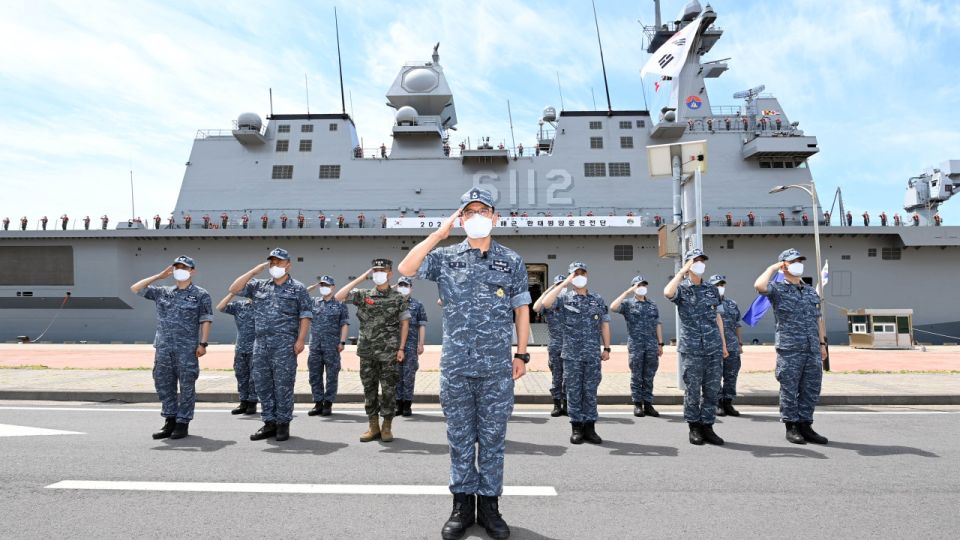June 1, 2022
SEOUL – South Korea has dispatched the largest-scale naval fleet and a brigadier general to the US-led multinational maritime exercise to be held in and around the Hawaiian Islands next month.
A flotilla of warships, maritime aircraft and troops left a naval base on the southern island of Jeju at noon Tuesday to participate in the biennial Rim of the Pacific (RIMPAC) Exercise, South Korea’s Navy announced the same day.
This year marks South Korea’s 17th participation in the RIMPAC exercise since 1990. The US Navy-led multinational maritime exercise is scheduled to be conducted in waters off Hawaii for 37 days from June 29 to Aug. 4.
South Korea’s Navy also underscored that the flotilla sent this time is the largest ever in scale compared to the size of the Navy and Marine Corps forces that were previously dispatched for overseas military exercises.
A total of three warships — which consist of the 14,500-ton Marado amphibious assault ship, the 7,600-metric-ton Sejong the Great-class Aegis destroyer equipped with SM-2 surface-to-air missiles and the 4,400-ton Munmu the Great destroyer — have been dispatched to Hawaii.
The 1,800-ton Shin Dol-seok attack submarine, one P-3 maritime surveillance aircraft, two Lynx multirole naval helicopters and nine Korean amphibious assault vehicles are set to participate in the 2022 RIMPAC exercise.
Around 1,000 military personnel, including one company of the Marine Corps’ amphibious force, four teams of Naval Special Warfare Flotilla, and the 59th Naval Mobile Construction Squadron have been sent as well.
In particular, it marks the first time that the landing platform helicopter ship Marado, which is the South Korean Navy’s largest vessel, the Shin Dol-seok submarine, indigenously developed Korea Amphibious Assault Vehicles, the 59th Naval Mobile Construction Squadron are participating.
South Korea also sent a one-star Navy official to the exercise for the first time since 1990.
During the naval drills, Rear Adm. An Sang-min on board the US amphibious assault ship USS Essex will command the Expeditionary Strike Group training which involves 13 warships from eight countries and around 1,000 Marine personnel from nine countries.
The RIMPAC exercise aims to enhance interoperability and operational capabilities of the combined forces, ensure the safety of sea lanes on the rim of the Pacific Ocean, and strengthen the common capabilities to respond to threats.
The participating countries will conduct various military drills such as anti-surface, anti-air and anti-submarine warfare exercises as well as expendable mobile anti-submarine warfare training target exercises, according to South Korea’s Navy.
RIMPAC is the world’s largest international maritime exercise and began in 1971 with the founding nations comprising Australia, Canada and the US. RIMPAC was held every year until 1974 when it turned into a biennial exercise due to its large scale.
A total of 26 countries, including Australia, Canada, Japan and the US expect to send 38 warships, four submarines, around 170 aircraft and some 25,000 military personnel to the 28th exercise this year, South Korea’s Navy said.
But China reportedly will not join the US-led naval drills this year amid the growing US-China rivalry. The People’s Liberation Army took part in RIMPAC in 2014 and 2016.
As the multinational naval drills are set to be staged amid growing cooperation among South Korea, the US and Japan on North Korea issues, eyes are riveted on whether the countries will conduct combined military exercises as in the past.
In 2016, the three countries staged the first Pacific Dragon ballistic missile defense exercise in Hawaii on the sidelines of the exercise with the goal of enhancing interoperability and coordination over detecting, tracking and assessing ballistic targets.
Vice Adm. Jon Hill, director of the US Missile Defense Agency, in June 2021, said the US will participate in Pacific Dragon-22 with South Korea, Australia and Japan this August at the Pacific Missile Range Facility Barking Sands in Hawaii.
The 2022 RIMPAC exercise will also kick off after the defense chiefs of South Korea, the US and Japan are highly likely to have their first in-person trilateral meeting in around 2 1/2 years on the occasion of the Shangri-La Dialogue to be held in Singapore between June 10 and 12.


